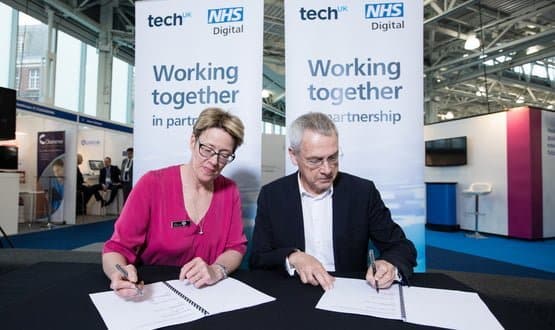NHS Digital and techUK enter into a strategic partnership

NHS Digital and techUK have entered into a strategic partnership to help “make the industry voice heard”.
The partnership aims to transform the way in which the industry accesses and consumes NHS Digital’s services.
Although the partnership was announced at eHealth Week in May this year, purdah had restricted further industry announcements and the issue of a press release – a techUK spokesman said.
At the time of the announcement and before her plans to leave NHS Digital as its director of digital transformation, Beverely Bryant said:
“The partnership with techUK will ensure that industry can begin to gear up for all the potential opportunities and inform NHS Digital’s strategy”.
She was joined by techUK’s chief executive, Julian David, who (at the event) added: “Delivering the NHS’s Paperless 2020 agenda will be no mean feat…delivering the agenda will require the true collaboration of many actors, and the UK tech sector is central to its success.”
A techUK spokesman said Bryant has been instrumental in fostering a spirit of partnership between industry and the NHS and will be sorely missed.
“That said, with the partnership in place and strong backing from the incoming chief executive we are confident that the partnership will gain in strength over the coming year.”
He said the aim of the partnership is to help address issues, get the right people around the table and make genuine progress towards the vision of a sustainable world-class digital health service.

“There are ambitious plans afoot to digitise health services. Progress on these plans will take collaboration between industry and government, so we have codified what was already a good and strong relationship between techUK and NHSD.”
An NHS Digital spokeswoman said the scale and complexity of the NHS’ digital transformation agenda presents a significant challenge for all, with underlying risks effecting the health and social care economy.
“By engaging the market early it will allow us to garner an understanding of the critical link between the intended outcome and the risk of delivery of our programmes”, the spokeswoman said.
“Ideally we’d like to support interactive engagement with suppliers to promote higher usage and better user experience and helping to put the user experience at the heart of products.”
They will conduct three (quarterly) industry briefings – providing the supplier community with an update and overview on NHS Digital work across the Health and Care Digitisation agenda. A NHS Digital supplier bi-monthly bulletin has also been launched.
The techUK spokesman said one of the most important areas they have been looking at is clinical triage.
“Tech can make huge inroads in this area for the benefit of patients, parents and professionals. This work will form part of a techUK paper to be published at the end of summer on alleviating some of the capacity issues that the NHS faces.”
He said much of techUK’s work focuses on how central NHS bodies can influence local bodies, “but we are increasingly asking trusts for their input into partnership work.”
“We need input and experience from the front-line to ensure the products and services our industry creates are taken up by users, be they clinicians, decision makers or the public.”
To keep up-to-date with partnership projects and activities you can sign up to NHS Digital and techUK’s email updates.
[themify_box icon=”info” color=”gray”]
What the partnership hopes to achieve:
- Transform the way industry access and consume NHS Digital services
- Share and exploit market opportunities created by the P2020 portfolio; consulting industry throughout the delivery life-cycle, horizon scanning technology advances and supporting the development of a vibrant digital health and care marketplace
- Develop a range of joint initiatives that will support the delivery of an integrated paper-free health and care system
- Develop more intelligent delivery chain which national organisations, local organisations and industry work effectively together, maximising benefit and minimising cost and risk
[/themify_box]





12 Comments
I think good journalism would state the status of techUK in this article.
This seems like a good move, but could someone from NHS Digital and TechUK confirm that you don’t have to be a member of TechUK in order to attend any of the events; because if you did, then that would be a retrograde step.
In the current market, there is no way on Earth that the smaller type of health providers (e.g. GPs), which are under such enormous pressure, should be having
to worry about the technical and the legal aspects of data sharing.My personal and honest opinion is that the responsibility and accountability for things such as breaches of Information Governance lay fairly and squarely either at the feet of the local CCG or NHS England (maybe ourNHS leaders would like to argue that one out !).
However, Doctors are the ones who should be discussing with their patients, whether or not they want to share
their data i.e. WHAT data and with WHICH organisations.
Walk into you local branch of *** bank or *** shop, no one working there is worried about data, they are all trying to help the people they serve.
Time for health leaders working at the national level to start living in the real world, large efficient businesses are DATA driven at the national level.
Privacy and security everyone’s responsibility. In most cases, it is the people and processes that go wrong, not the technology. Those on the front line.
People in banks do not worry about it because they have teams behind them and it is systematised – part of what they do. Ask them for a print out, “chip and pin” please. no “chip and pin”? passport please. Need a password reset, there is a clear process for that. Want to transfer money, there’s a clear process for that too. Not to mention the regulation and governance.
If a few bankers got together and tried to set up a bank because “they know banking best” they would simply fall at the first hurdle. Banking is not just about bankers. Healthcare is not just about doctors, yet this seems to be the way GPs prefer to operate.
With the incoming GDPR legislation, the bar is rightly being raised. Everyone needs to be implementing (“worrying”) about what they are doing. Whether you are public or private, big or small, paper or digital it impacts you.
The responsibility sits at the feet of those accountable in an organisation whether that is the board of a corporate or a sole trader.
When you set up a small business or become a contractor you sign up for the DPA, GDPR, etc. it comes with the territory.
Even if you outsource your IT and security you are still accountable. So as much as CCGs and CSUs could/should provide services, it is still your neck on the block.
GDPR is simply a step change from the DPA, but the problem is the NHS hasn’t done a great job of that either. Dame Fiona Caldicott has long spoken out on this in particular in 2013.
My yard stick: If you are a GP who tells patients you can’t use email for security reasons you probably have more to worry about than those who do use email.
I don’t see why I need to involve my GP in the sharing of my information. He/she should be seeking my approval.
We need to stop this paternalistic view on consent and OUR data. We need a simple sharing api and a method to allow me to consent or dissent (not one year of meetings for NHS staff to come to a very poor solution)
agree but if you don’t understand the concepts then a GMP is probably the best HCP to explain them to you, they are still trusted
That’s fine if people want the option of speaking to someone.
Giving me the option is technically simple and many of us already do this with our PHR or health apps we have.
This is true. A much better model is that the patient owns and controls the complete record.
The GP is still responsible for the data they hold and what they do with it. You want to be sure that GPs and the wider NHS have privacy and security at the heart of what they do.
I agree with you Dan, even if a person doesn’t need access to or wouldn’t be able to do much with IT, health decision makers should still “think like a patient”, “put themselves in the shoes of the patient” (after all we are all on a health journey). Just what would the patient be interested in? Some complicated coding? I don’t think so, they would be interested in the www (what, where , when) and patients need to be engaged in understanding their health journeys and what health journies cost, after all, it is their journey, and where apropriate, people should not be kept in the dark about just how much they cost, even if they want to stay in the dark (i.e. they should have access to the costs).
Tor – totally agree that patients should have full control over what medical information is shared and with who, but what about all the patients who would not want or are not able to be the controller for their record. Provision has to be made for them too. And what about those who are vulnerable and could be abused? Who’s duty is it to protect them? What about children who are not able to make a decision yet. And if as Dan suggests patients own and control their record then who is responsible for paying and managing the storage and the security of it? If your data is breeched who is responsible? Who gets the fine?
Patients are the ‘data subjects’ but the GP is still legally the ‘data controller’ under the data protection act. This seems unlikely to change soon but until it does then it is the GP that has to make the final decision and the GP who can be fined for getting it wrong.
I am all for patient’s accessing and controlling access to their medical record and admit some of my colleagues are paternalistic but it is more complicated than is often made out.
I’m not saying that shouldn’t be done but let’s do the easy cheap parts or grab low hanging fruit first.
Let’s not wait for the lowest common denominator to eventually come out the committees .
There is one key thing the NHS now needs to do now and that is comply with GDPR in a technically appropriate manner.
Make data available to patients in a machine readable format using APIs and enable the individual to do as they choose with their health data.
Anything else is slamming the door on progress, industry and innovation.
Comments are closed.